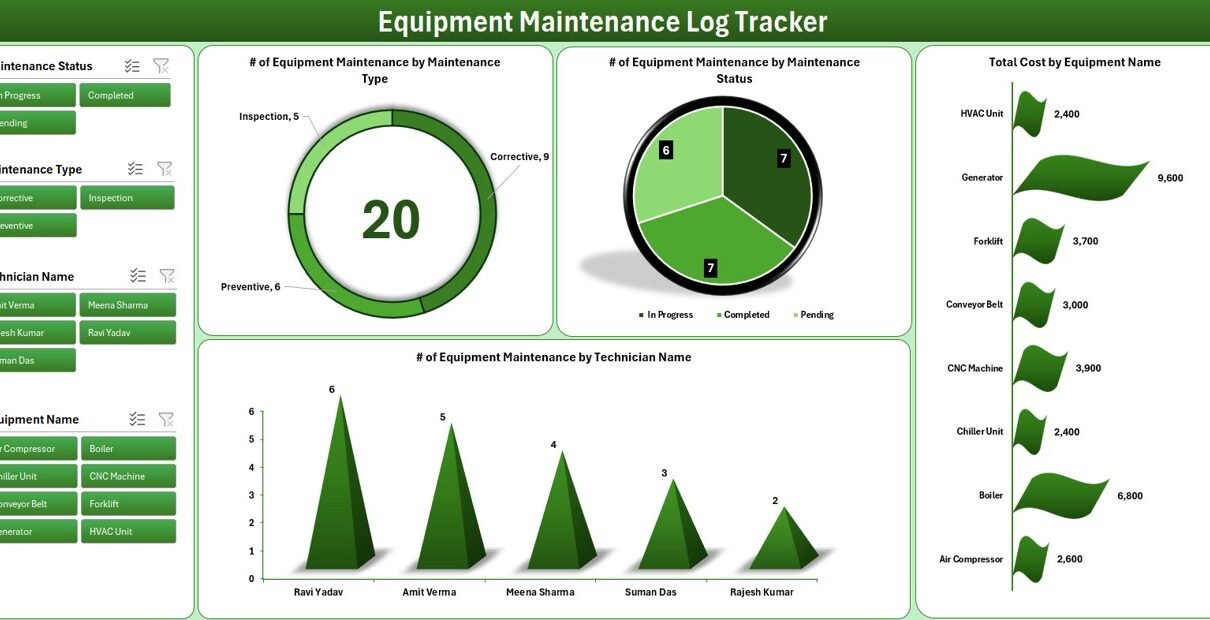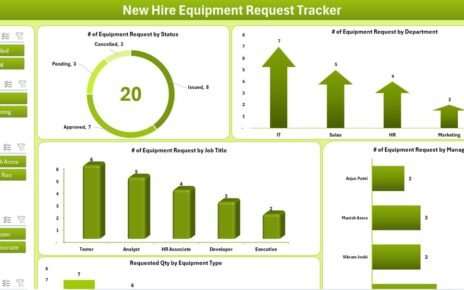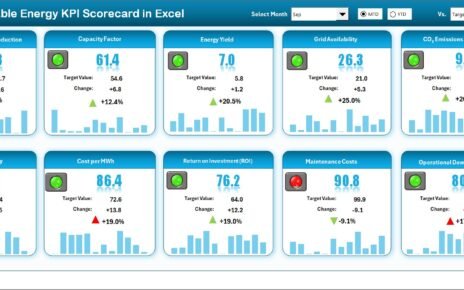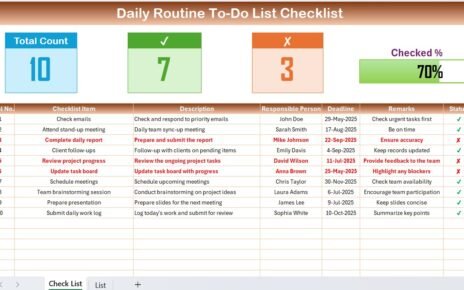In every industry, equipment plays a vital role in daily operations. Whether it’s manufacturing machinery, IT systems, or HVAC units, one common thread remains—equipment must be maintained regularly to avoid costly breakdowns. This is where an Equipment Maintenance Log Tracker in Excel becomes essential.
Using Excel, paired with a smart VBA-based user interface, you can now manage maintenance schedules, track repairs, analyze costs, and generate instant reports. In this article, we’ll introduce you to a powerful Excel and VBA-based Equipment Maintenance Log Tracker, explain how it works, highlight its advantages, and show you best practices for using it effectively.
Click to Purchases Equipment Maintenance Log Tracker in Excel
What Is an Equipment Maintenance Log Tracker in Excel?
An Equipment Maintenance Log Tracker in Excel is a spreadsheet-based tool designed to help businesses monitor, schedule, and analyze maintenance activities for their equipment. It allows you to record every detail—such as maintenance date, technician, cost, parts replaced, and next due date.
This tool includes:
-
A secure login system
-
A fully functional data entry form
-
A dashboard with slicers and visual charts
-
User management and settings configuration
-
Automated reports and editable lists
Unlike expensive software, this Excel-based solution is easy to use, budget-friendly, and highly customizable.
Key Features of the Equipment Maintenance Log Tracker
Let’s walk through the main components of this tracker and how they simplify your workflow:
Login Form
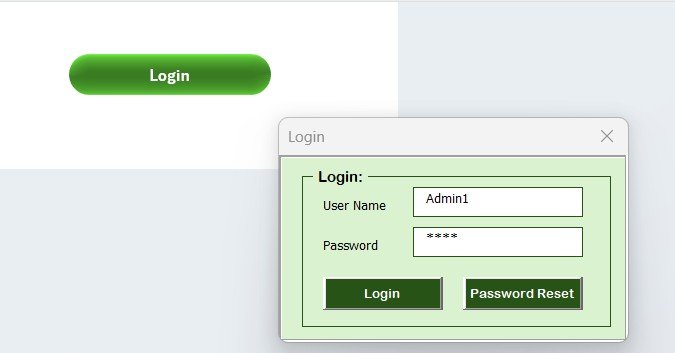
The system starts with a secure login screen. You can use the admin ID Admin1 and password abcd to access the system. Simply hit enter or click “Login” to proceed.
Click to Purchases Equipment Maintenance Log Tracker in Excel
Main Form Interface
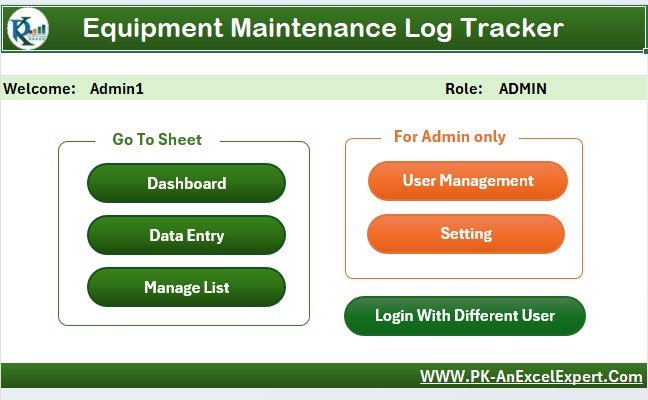
Once logged in, you land on the Main Form—the control center of the tool. This interface allows users to:
-
Add new maintenance records
-
Edit existing records
-
Delete unnecessary records
-
Access the dashboard, lists, and user management
This form ensures user-friendly navigation and keeps all functions in one place.
Dashboard Sheet Tab
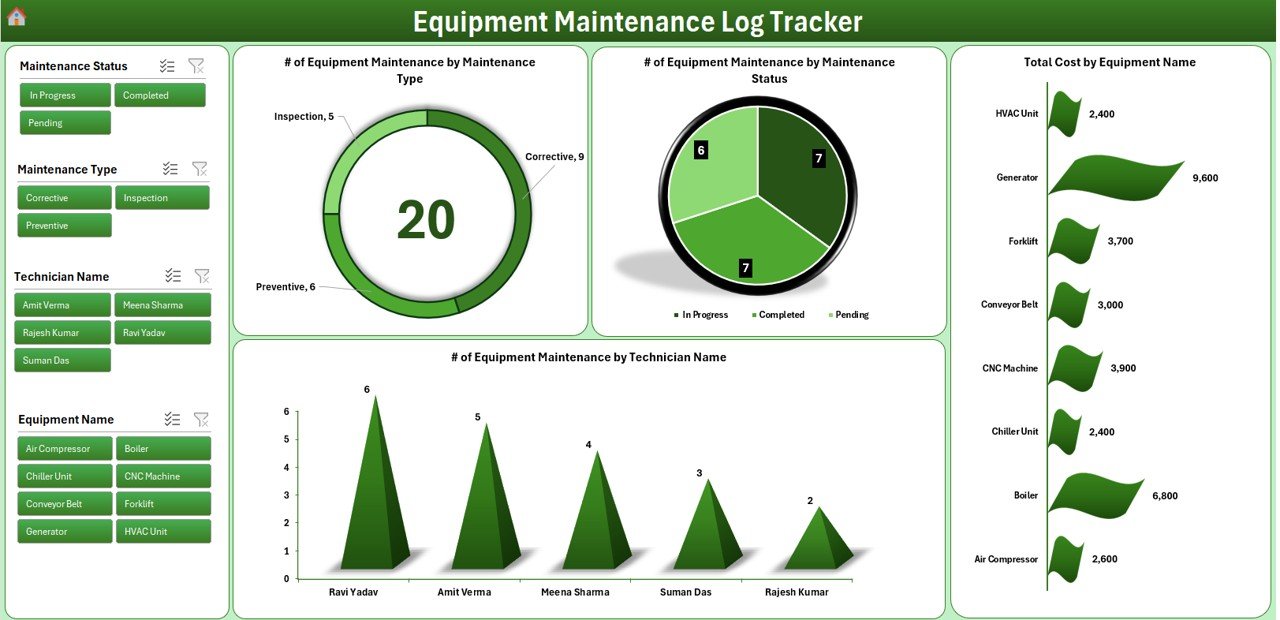
The dashboard offers real-time visual insights. It includes:
-
4 Slicers: Filter by maintenance type, equipment, status, and technician
-
Doughnut Chart: Maintenance count by type
-
Pie Chart: Maintenance by status
-
Bar Chart: Total maintenance cost by equipment
-
Chart: Equipment-wise maintenance summary
These visuals help identify patterns, inefficiencies, and high-cost assets.
Data Entry Sheet Tab

This tab stores all maintenance records. It includes the following columns:
-
ID
-
Equipment Name
-
Maintenance Date
-
Technician Name
-
Maintenance Type
-
Issue Reported
-
Action Taken
-
Parts Replaced
-
Cost
-
Next Due Date
-
Maintenance Status
-
Remarks
Buttons on Top:
Add New Record

- Opens the form for fresh data entry
Update Record
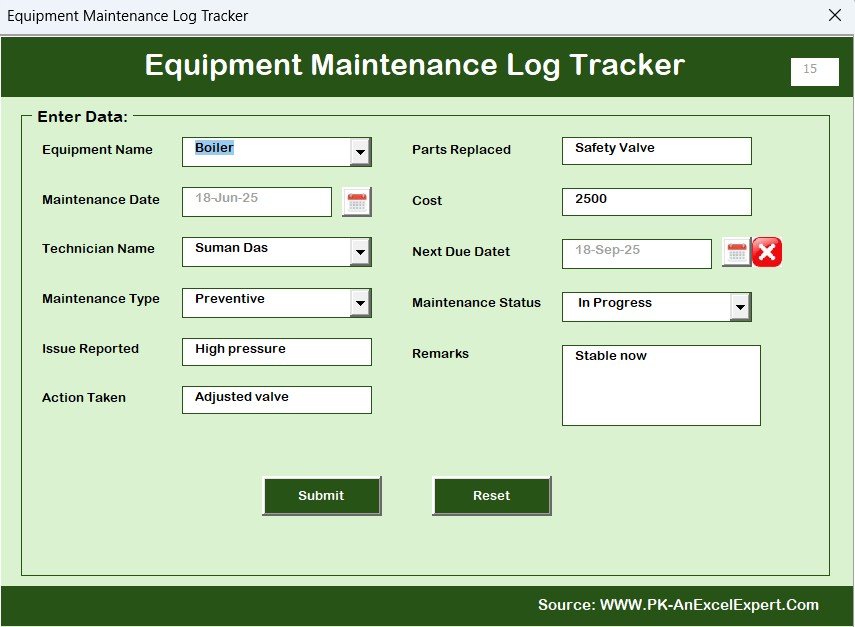
- Select an ID, load the form with existing data, and make changes
-
❌ Delete Record – Select an ID and confirm to remove the record
This tab is dynamically connected to the dashboard for live updates.
Manage List Sheet Tab
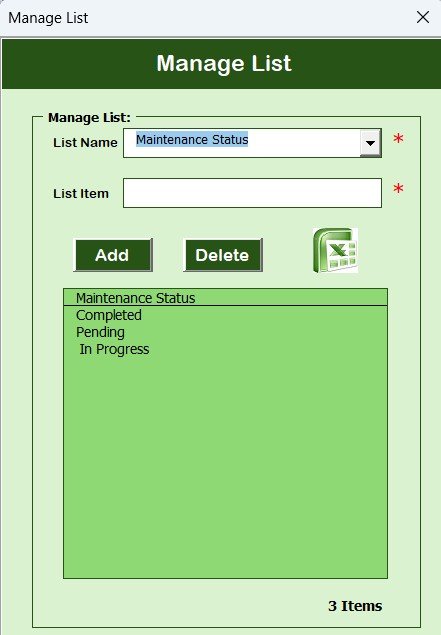
Create and manage drop-down options here. The list includes:
-
Equipment Name
-
Technician Name
-
Maintenance Type
-
Maintenance Status
Use the Add/Delete buttons to manage items, which then appear in the combo boxes on the data form.
Click to Purchases Equipment Maintenance Log Tracker in Excel
Support Sheet Tab

This sheet powers the dashboard visuals. It includes pivot tables based on the data sheet. You don’t need to modify this—just keep it hidden and let it do the backend work.
User Management
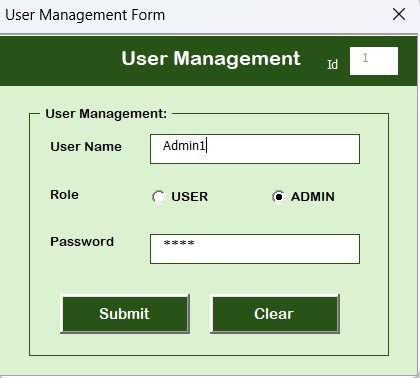
Admins can add, edit, or delete users using this form. You can also reset or change passwords. This feature ensures access control and user accountability.
Advantages of Using the Equipment Maintenance Log Tracker
Let’s explore why this tool is a must-have:
1. 📅 Improved Scheduling
Automate reminders for next due dates and never miss routine maintenance again.
2. 💸 Cost Analysis
Track the cost of each repair and analyze which machines cost more to maintain.
3. 📊 Instant Reporting
Get visual summaries with real-time slicers and charts—perfect for management reporting.
4. 🔧 Detailed Recordkeeping
Log detailed descriptions of actions taken, parts replaced, and technician info for each task.
5. 💻 Customizable and Scalable
Add more equipment types, technicians, or maintenance statuses without any coding.
6. 🔐 Secure Access Control
Use the login and user management system to keep data secure and limit access.
7. 📈 Data-Driven Insights
Make informed decisions about equipment upgrades, replacements, or budget reallocations.
Best Practices for Using the Maintenance Tracker
Follow these best practices to get the most value from the tool:
✔️ Regular Data Entry
Update the tracker immediately after any maintenance task. Avoid batch updates.
✔️ Use Consistent Terminology
Ensure dropdowns like “Maintenance Type” use uniform naming (e.g., “Preventive,” not “Preventative”).
✔️ Monitor Dashboard Weekly
Review charts every week to spot high-maintenance equipment or cost surges.
✔️ Review Technician Performance
Analyze technician-wise data to find high-performing staff or training needs.
✔️ Update Lists Frequently
Keep the “Manage List” sheet updated with new technicians, types, and status categories.
✔️ Backup Monthly
Take backups of your Excel file monthly to protect against accidental data loss.
Who Should Use This Tracker?
This tool is ideal for:
-
Manufacturing Units
-
Facilities Management Teams
-
Hospitals and Clinics
-
Educational Institutions
-
Retail Chains
-
Office Buildings
-
Data Centers
Any business that manages multiple assets and machines can benefit from structured maintenance tracking.
How Does This Tracker Improve Maintenance Planning?
It helps you move from reactive to proactive maintenance. Here’s how:
-
You can forecast maintenance due dates.
-
Track which machines are breaking down frequently.
-
Plan bulk spare part purchases.
-
Avoid emergency repairs by spotting early warning signs in data.
Ultimately, this tool transforms your maintenance approach from manual chaos to organized efficiency.
Why Choose Excel for Maintenance Tracking?
Still wondering why Excel is a good choice?
-
💡 Familiar to most users—no training needed
-
🧩 Easily customizable
-
💰 No additional software cost
-
📎 Compatible with cloud sharing
-
🔄 Integrates with other business processes
You get powerful automation without leaving the Excel ecosystem.
Conclusion
The Equipment Maintenance Log Tracker in Excel is a practical, ready-to-use solution that simplifies the entire process of asset maintenance. From data entry to dashboard reporting and secure user management, everything is built into this powerful tool.
If you’re tired of manual tracking, costly breakdowns, or scattered maintenance logs, now is the time to adopt this tracker. It’s simple, affordable, and packed with automation to keep your operations smooth.
❓ Frequently Asked Questions (FAQs)
Click to Purchases Equipment Maintenance Log Tracker in Excel
1. Can I add more equipment types or maintenance categories?
Yes! You can update the “Manage List” tab to include any number of equipment names, maintenance types, and statuses.
2. Is this tool password-protected?
Yes. It includes a secure login form with customizable user credentials.
3. Do I need coding knowledge to use this tool?
No. It’s fully functional with buttons and drop-downs. No coding is required.
4. Can I share this tracker with my team on the network?
Yes, you can share it over a shared drive or network folder for collaborative use.
5. Will the dashboard update automatically after entering data?
Absolutely! As soon as you submit a new record or update an existing one, the dashboard refreshes automatically.
6. Can I track costs and spare parts usage?
Yes. You can log cost details and specify parts replaced during each maintenance task.
7. Is this tool suitable for non-technical users?
Definitely. The interface is intuitive, and all actions are button-driven. Anyone familiar with Excel can use it easily.
Visit our YouTube channel to learn step-by-step video tutorials
Click to Purchases Equipment Maintenance Log Tracker in Excel
Watch the step-by-step video tutorial:
